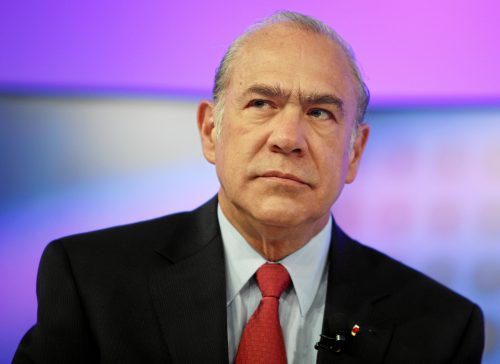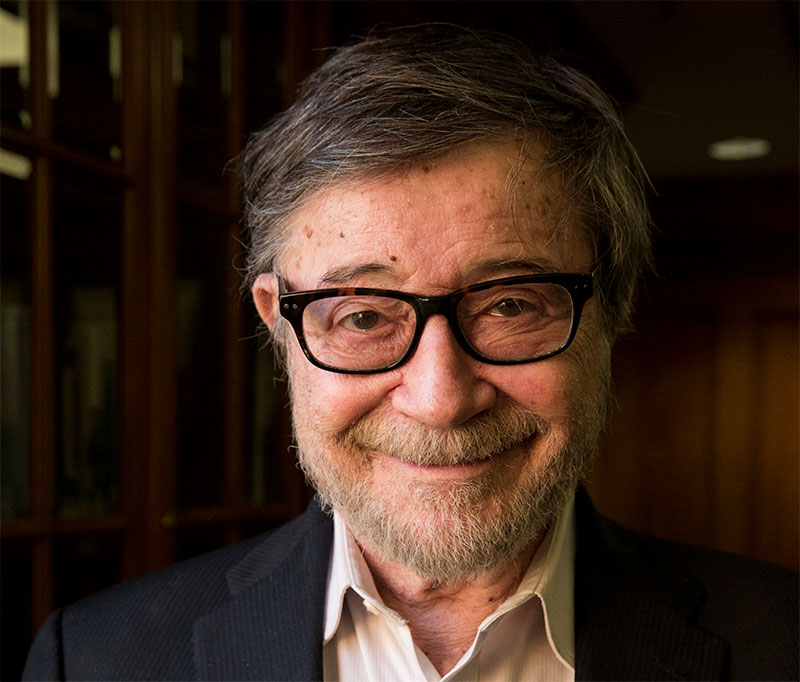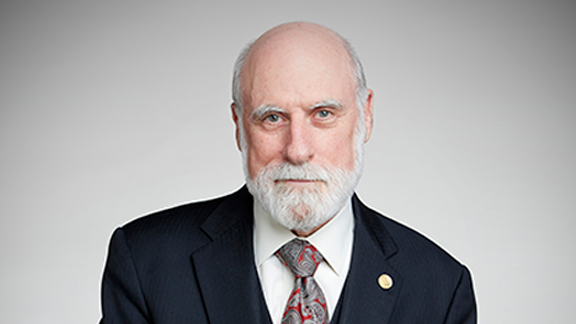World Leaders in AIWS
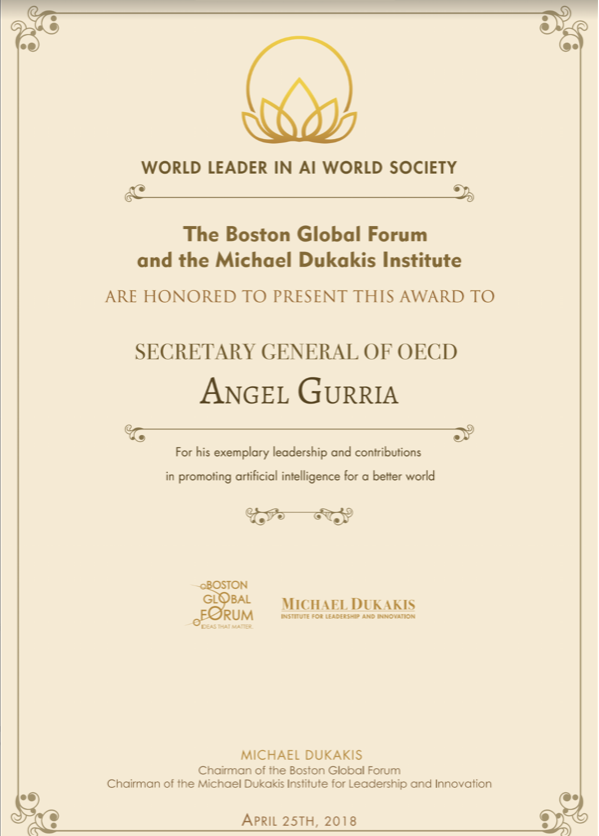
Secretary General of the Organisation of Economic Co-operation and Development (OECD)
As Secretary General of the Organisation of Economic Co-operation and Development (OECD) since 2006, Ángel Gurría has firmly established the Organisation as a pillar of the global economic governance architecture including the G7, G20 and APEC, and a reference point in the design and implementation of better policies for better lives. He has broadened OECD’s membership with the accession of Chile, Estonia, Israel, Latvia and Slovenia, and has made the Organisation more inclusive by strengthening its links with key emerging economies.
Since 2010, Ángel Gurría has also served as a Commissioner for the Broadband Commission for Digital Development, which is dedicated to the use of broadband technologies as a means of social and economic development.
Before becoming head of the OECD, he was Mexico’s Secretary of Foreign Affairs and Secretary of Finance. He was instrumental in the negotiation of NAFTA and in guiding Mexico through its 1994 financial crisis. He also headed Mexico’s National Development Bank and chaired the Inter-American Development Bank’s External Advisory Group.
He is the recipient of many awards and honors, including recognition by the French, Dutch, and Korean governments. He was the inaugural recipient of the Canadian International Council’s Globalist of the Year Award, for his efforts in promoting global cooperation and consciousness.
Under Ángel Gurría’s leadership, OECD is leading the effort to reform the international tax system, and to improve governance frameworks in anti-corruption and other fields. OECD is addressing issues surrounding the development of Artificial Intelligence based on two fundamental questions:
What sort of policy and institutional frameworks should guide AI design and use?
And: How can we ensure that AI benefits society as a whole?
For his leadership on AI, the Boston Global Forum and the Michael Dukakis Institute honored to recognize Secretary General Ángel Gurría as the inaugural recipient of the World Leader in AI World Society on April 25, 2018 at Harvard Faculty Club.
Professor Judea Pearl
Mentor of AI World Society Innovation Network – World Leader in AI World Society
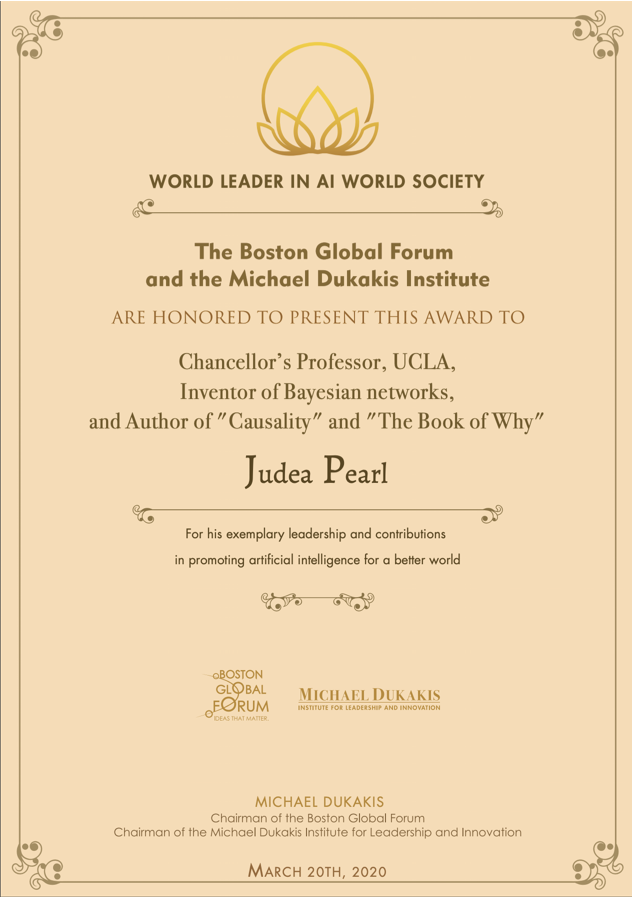
Professor Judea Pearl is a Professor of Computer Science at University of California, Los Angeles.
He is a leader in Artificial Intelligence (AI). Pearl invented Bayesian networks, presenting a
thoroughgoing calculus of probabilistic inference in a book and an important series of papers in the
1980s. His Bayesian networks have had major impact throughout AI and statistics and have played
key roles in fields as diverse as computational biology and error-control coding. He is the author
of Heuristics: Intelligent Search Strategies for Computer Problem Solving (1984), which provided
foundation for three decades of subsequent work on search and planning in AI. Pearl's book
on Causality: Models, Reasoning, and Inference (2nd ed., 2009) introduces a calculus that enables
machines to reason about actions and observations and assists scientists in assessing cause-effect
relationships from empirical data. His research serves as the foundation for Google searches, credit-
card fraud detection systems, and automated speech recognition systems. Pearl was also awarded the
Association for Computing Machinery's A.M. Turing Award (2011).
“The Book of Why: The New Science of Cause and Effect, best science books 2018, provides us with
the new tools needed to navigate the uncharted waters of causality for scholars, and students of
statistics, economics, social sciences, mathematics and most urgently today, epidemiology.
Professor Judea Pearl has been honored as 2020 World Leader in AI World Society by Michael
Dukakis Institute and the Boston Global Forum. He is a Mentor of AI World Society Innovation
Network (AIWS.net).
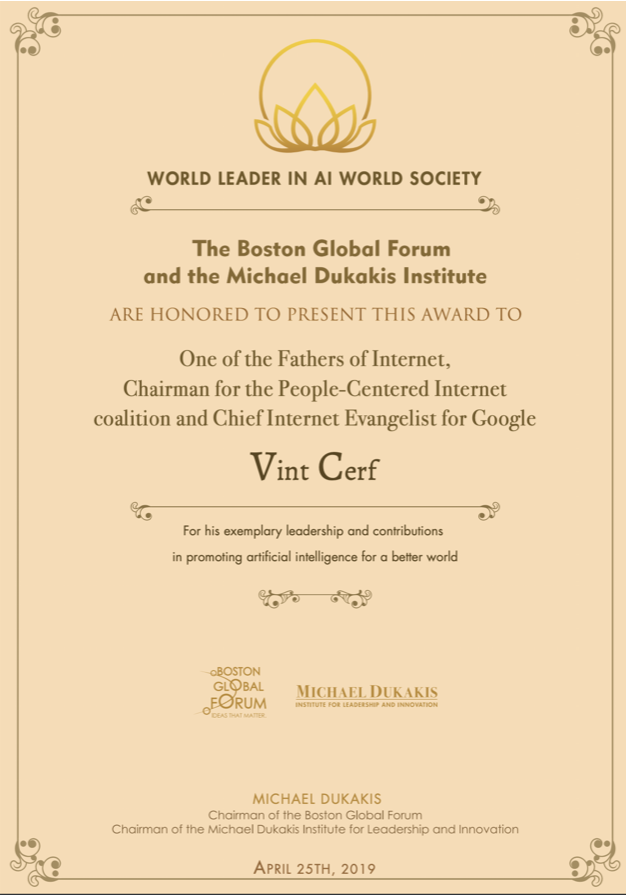
Vinton G. Cerf has served as vice president and chief Internet evangelist for Google since October 2005. In this role, he is responsible for identifying new enabling technologies to support the development of advanced, Internet-based products and services from Google. He is also an active public face for Google in the Internet world.
Cerf is the former senior vice president of Technology Strategy for MCI. In this role, Cerf was responsible for helping to guide corporate strategy development from the technical perspective. Previously, Cerf served as MCI’s senior vice president of Architecture and Technology, leading a team of architects and engineers to design advanced networking frameworks including Internet-based solutions for delivering a combination of data, information, voice and video services for business and consumer use.
Widely known as one of the “Fathers of the Internet,” Cerf is the co-designer of the TCP/IP protocols and the architecture of the Internet. In December 1997, President Clinton presented the U.S. National Medal of Technology to Cerf and his colleague, Robert E. Kahn, for founding and developing the Internet. Kahn and Cerf were named the recipients of the ACM Alan M. Turing award in 2004 for their work on the Internet protocols. The Turing award is sometimes called the “Nobel Prize of Computer Science.” In November 2005, President George Bush awarded Cerf and Kahn the Presidential Medal of Freedom for their work. The medal is the highest civilian award given by the United States to its citizens. In April 2008, Cerf and Kahn received the prestigious Japan Prize.
Prior to rejoining MCI in 1994, Cerf was vice president of the Corporation for National Research Initiatives (CNRI). As vice president of MCI Digital Information Services from 1982-1986, he led the engineering of MCI Mail, the first commercial email service to be connected to the Internet. During his tenure from 1976-1982 with the U.S. Department of Defense’s Advanced Research Projects Agency (DARPA), Cerf played a key role leading the development of Internet and Internet-related packet data and security technologies.
Vint Cerf served as chairman of the board of the Internet Corporation for Assigned Names and Numbers (ICANN) from 2000-2007. Cerf also served as founding president of the Internet Society from 1992-1995 and in 1999 served a term as Chairman of the Board. In addition, Cerf is honorary chairman of the IPv6 Forum, dedicated to raising awareness and speeding introduction of the new Internet protocol. Cerf served as a member of the U.S. Presidential Information Technology Advisory Committee (PITAC) from 1997 to 2001 and serves on several national, state and industry committees focused on cyber-security. Cerf sits on the Board of Directors for the Endowment for Excellence in Education, the Americas Registry for Internet Numbers (ARIN), CosmosID, StopBadWare, the Gorilla Foundation and the Intaba Institute (for the Deaf). Cerf also sits on the Board of Associates of Gallaudet University. He serves on the Jet Propulsion Laboratory Advisory Committee and serves as Chair of the Visitors Committee on Advanced Technology of the U.S. National Institute of Standards and Technology. He also serves as 1st Vice President and Treasurer of the National Science & Technology Medals Foundation. Cerf is a Fellow of the IEEE, ACM, and American Association for the Advancement of Science, the American Academy of Arts and Sciences, the International Engineering Consortium, the Computer History Museum, the Annenberg Center for Communications at USC, the Swedish Royal Academy of Engineering, the American Philosophical Society, the Hasso Platner Institute and is a member of the US National Academy of Engineering. In 2011, he was made Distinguished Fellow of the British Computer Society.
Cerf is a recipient of numerous awards and commendations in connection with his work on the Internet. These include the Marconi Fellowship, Charles Stark Draper award of the National Academy of Engineering, the Prince of Asturias award for science and technology, the National Medal of Science from Tunisia, the St. Cyril and St. Methodius Order (Grand Cross) of Bulgaria, the Alexander Graham Bell Award presented by the Alexander Graham Bell Association for the Deaf, the NEC Computer and Communications Prize, the Silver Medal of the International Telecommunications Union, the IEEE Alexander Graham Bell Medal, the IEEE Koji Kobayashi Award, the ACM Software and Systems Award, the ACM SIGCOMM Award, the Computer and Communications Industries Association Industry Legend Award, installation in the Inventors Hall of Fame, the Yuri Rubinsky Web Award, the Kilby Award , the Rotary Club International Paul P. Harris Medal, the Joseph Priestley Award from Dickinson College, the Yankee Group/Interop/Network World Lifetime Achievement Award, the George R. Stibitz Award, the Werner Wolter Award, the Andrew Saks Engineering Award, the IEEE Third Millennium Medal, the Computerworld/Smithsonian Leadership Award, the J.D. Edwards Leadership Award for Collaboration, World Institute on Disability Annual Award and the Library of Congress Bicentennial Living Legend medal. Cerf was inducted into the National Inventors Hall of Fame in May 2006. He was made an Eminent Member of the IEEE Eta Kappa Nu (HKN) honor society in 2009. In 2010 he received a Lifetime Webby Award. In February 2011 he was named a Stanford Engineering School “Hero” for his work on the Internet and received a lifetime achievement award from the Oxford Internet Institute. In December 1994, People magazine identified Cerf as one of that year’s “25 Most Intriguing People.”
In addition to his work on behalf of Google and the Internet, Cerf has served as a technical advisor to production for “Gene Roddenberry’s Earth: Final Conflict” and made a special guest appearance on the program in May 1998. Cerf has appeared on television programs NextWave with Leonard Nimoy and often co-hosted World Business Review with Alexander Haig and Caspar Weinberger. Cerf also holds an appointment as distinguished visiting scientist at the Jet Propulsion Laboratory where he is working on the design of an interplanetary Internet. Cerf holds a Bachelor of Science degree in Mathematics from Stanford University and Master of Science and Ph.D. degrees in Computer Science from UCLA. He also holds honorary Doctorate degrees from the Swiss Federal Institute of Technology (ETH), Zurich; Lulea University of Technology, Sweden; University of the Balearic Islands, Palma; Capitol College, Maryland; Gettysburg College, Pennsylvania; George Mason University, Virginia; Rovira i Virgili University, Tarragona, Spain; Rensselaer Polytechnic Institute, Troy, New York; the University of Twente, Enschede, The Netherlands; Brooklyn Polytechnic; Marymount University; the University of Pisa; the Beijing University of Posts and Telecommunications; Tschingua University, Beijing, China; the University of Zaragoza, Spain; the Technical University of Cartagena, Spain; the Polytechnic University of Madrid, Spain; Bethany College, Kansas; the Moscow State University of International Relations and the Buenos Aires Institute of Technology.
His personal interests include fine wine, gourmet cooking and science fiction. Cerf and his wife, Sigrid, were married in 1966 and have two sons, David and Bennett.




